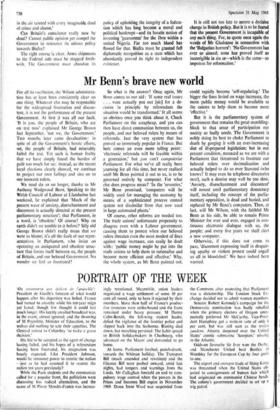PORTRAIT OF THE WEEK
'On retournera aux (takes de l'anarchie':
President de Gaulle's forecast of what would happen after his departure was belied. France had turned to anarchy while his ten-year reign yet lasted, though few thought it could last much longer. His keenly awaited broadcast was, in the event, almost ignored; and the throwing of M Peyrefitte, Minister of Education, to the wolves did nothing to sate their appetites. The General retired to Colombey `to make a grave decision.'
His bid to be accepted as the agent of change having failed, and his hopes of a referendum having been frustrated, his resignation was hourly expected. Like President Johnson, would he renounce power to reunite the nation —just as he had assumed it to reunite the nation ten years previously?
While the Paris students and the communists called for a popular front, the politicians were discussing less radical alternatives, and the name of M Pierre Mend6s-France was increas- ingly mentioned. Meanwhile, union leaders negotiated a wage settlement of some 10 per cent all round, only to have it rejected by their members. More than half of France's produc- tive resources were strike-bound and the franc remained under heavy pressure. M Danny Cohn-Bendit, the left-wing student leader, defied the yigilance of The frontier police and slipped back into the Sorbonne. Rioting died down, but marching persisted. The habit spread to British holidaymakers in Cherbourg, who advanced on the Mayor and demanded to go home.
At home, Parliament lurched, punch-drunk, towards the Whitsun holiday. The Transport Bill (much amended and rewritten) and the Finance Bill were pushed onward, amid late nights, bad tempers and warnings from the Lords. Mr Callaghan foretold an end to com- pulsory wage control when the powers in the Prices and Incomes Bill expire in November 1969. Dame Irene Ward was suspended from the Commons after protesting that Parliament was a dictatorship. The London Stock Ex- change decided not to admit women members.
Senator Robert Kennedy's campaign for the Democratic nomination was badly rebuffed when the primary electors of Oregon unex- pectedly preferred Mr McCarthy. Vice-Presi- dent Humphrey got a write-in vote of only 4 per cent, but was still seen as the tertius gaudens. Anxiety deepened over the United States' atomic submarine 'Scorpion,' missing in the Atlantic.
Odds-on favourite Sir Ivor won the Derby, and Manchester United beat Benfica at Wembley for the European Cup by four goals to one.
The export and entrepot trade of Hong Kong was threatened when the United States ob- jected to consignments of human hair which had originated on communist Chinese heads. The colony's government decided to set UP a wig patrol.






































 Previous page
Previous page